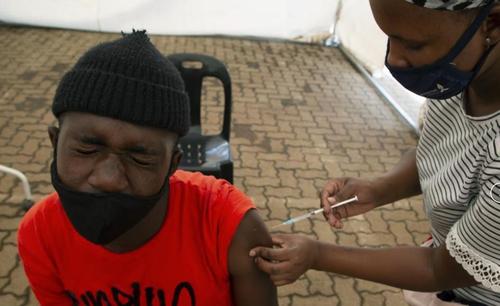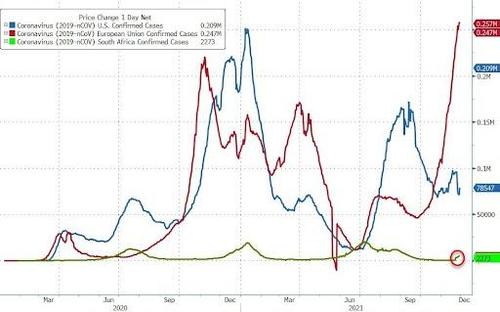COVID Cases In South Africa’s Omicron Epicenter Decline As Hysteria Rattles Global Markets
With so many contradictory comments hitting the wire, investors might be struggling to parse what omicron actually means for the global economy. Will the mutated virus cut through vaccine-induced immunity like butter leading to another global outbreak? Or is the latest variant scare merely a ruse for vaccine-makers to hawk more jabs, while governments from the US, to Europe and elsewhere now have the cover to make vaccinations and boosters mandatory? There’s very little hard data available. But what is available warrants due consideration.
For example, the latest data out of South Africa, where scientists initially sounded the international alarm over omicron, suggest that the variant isn’t causing the surge in cases that many feared might emerge.
COVID cases in Guateng, seen as the epicenter of South Africa’s COVID outbreak, and the cauldron from which omicron emerged, declined to 1,909 on Nov. 29 from 2,308 a day earlier. The day before that, the number in Gauteng was just 2,629, showing two straight days of successive declines. But this data has been largely ignored by the mainstream press peddling FUD about the new variant.
A chart showing the 7-day average in South Africa, the EU and the US over the past year shows omicron hasn’t caused a surge in new cases. In fact, COVID numbers are relatively stable, despite the fact that a growing number of developed nations – most recently Japan – has imposed travel restrictions on South Africa and its neighbors.
The number of confirmed omicron cases around the world is still relatively tiny (although the exact number of confirmed cases of omicron globally remains unclear). But the EU has recorded at least 44 confirmed cases of the omicron variant in 11 countries, including the Netherlands, which purportedly saw its first cases of omicron arrive weeks ago. Dutch authorities said the variant had arrived in Europe as early as Nov. 19, prior to the arrival of two flights from South Africa that are believed to have carried the virus.
If the data does show a need for new COVID vaccines to combat the new variant, the EMA says new jabs could be developed and approved within three to four months.
But so far, the numbers show no severe cases of illness or death tied to the new variant.
Source: Reuters
But setting aside the impact on cases, hospitalizations and deaths, Economists’ big fear right now is that the omicron panic could dent consumer confidence, which could in turn serve to weaken the recovery, particularly in the UK and Europe where the situation is more delicate, and where lockdowns across the Continent have made things more complicated this far into what some have described as a “fourth wave” of COVID some believe to be driven by seasonal factors. In Germany, chancellor-in-waiting Olaf Scholz said he would consider vaccine mandates.
Going forward, investors will need to parse for themselves whether governments and vaccine-makers’ warnings about omicron are self-serving, or legitimate concerns based on data.
Tyler Durden
Tue, 11/30/2021 – 11:28
via ZeroHedge News https://ift.tt/3EadIZ6 Tyler Durden


